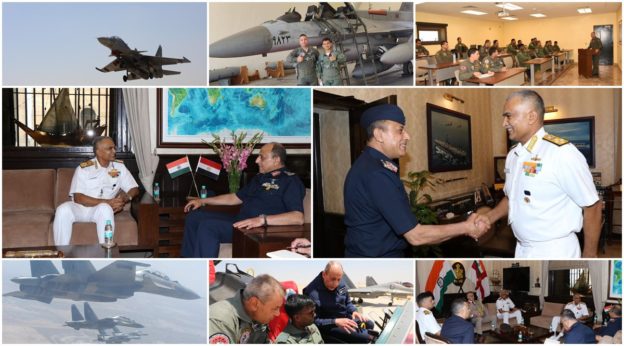It was part of the Egyptian navy’s joint training programmes with global navies to further enhance the combat capabilities of its personnel, and to enable them to deal with the emerging threats and challenges in the region and in the maritime domain.
India is keen on keeping its geopolitical options open in a shifting global security landscape. Both New Delhi and Cairo are working towards deeper cooperation especially in maritime security and defence.
Indian Air Force (IAF) reaches Cairo West Air base
A contingent from the IAF has reached the midway point of the Tactical Leadership Programme (TLP) at Cairo West Air base. This programme is taking place at the Egyptian Air Force (EAF) Weapon School in Egypt.
The programme according to the IAF started on June 24 and will conclude later this month on July 23. And three Su-30 MKI aircraft have been deployed to participate in this and two C-17 transport aircraft were used for the induction of the contingent.
The Su-30MKI of IAF took off from Jamnagar airbase and had undertaken a nonstop ferry of six hours to Cairo West air base (Egypt). And it flew over four countries enroute including United Arab Emirates (UAE), Oman, Bahrain and Saudi Arabia.
What is a Tactical Leadership Program?
In this unique drill IAF is taking part with its aircrew as instructors, and this will give a chance to showcase their reach and capability.
Being part of this drill is also an opportunity to focus on deepening military cooperation between the two countries and sharing best practices.
Alongside Egyptian F-16, Rafale and MiG 29 aircraft, in the first two weeks of the drill, IAF aircraft participated in missions by day and night. This involved air-to-ground and air-to-air combat scenarios; and Combat Search and Rescue (CSAR) activity.
According to an official statement, since the Su-30MKI was flying alongside the Egyptian Air Force, it was an opportunity to showcase India’s capability in building aircraft, spares and other components locally.
Importance of building Military Cooperation with Egypt
Sharing his views with Financial Express Online, US based Daniel Darling, Senior Military Markets Analyst, Europe & Asia/Pacific Rim, Forecast International Inc, says, “The Middle East remains vital to India’s energy supply and therefore its crucial to remain on good terms with supplier nations, as well as deepening defence ties with key countries in the region such as Egypt, Saudi Arabia and the UAE.”
“These are the main power-broker Arab states and crucial for ensuring open sea lines of communication and supply, diplomatic support, and building confidence on a military-to-military basis,” US based Daniel Darling opines.
Defence Exports
India is also keen to expand its defence export basket and “is exploring opportunities in the Middle East, Southeast Asia as well as Africa,” said a top officer in the Ministry of Defence.
Big visits back to back
Recently a delegation from the Egyptian Air Force was in New Delhi led by their Air Chief Mahmoud Foaad Abd El-Gawad. The delegation from Cairo discussed future engagements with the Indian armed forces and explored the possibilities of future engagement with the Indian defence industry for imports of various weapons and platforms.
Earlier this month Lt General Mohamed Abbas Helmy, Commander-in-Chief Egyptian Air Force had called on Admiral R Hari Kumar, Chief of the Naval Staff, Indian Navy, in New Delhi. According to an official statement of the Indian Navy, the two focussed on the growing defence cooperation between the two sides and agreed to explore new avenues. The Indian Navy Chief highlighted prowess of Indian Defence Industry and enhanced impetus on indigenisation of equipment for Indian Armed Forces.
In June this year, INS Kochi, which was deployed in the Red Sea, visited Port Safaga in Egypt. During this visit personnel from both sides carried out ship visits. And on her departure on June 30 from Safaga, INS Koch had participated in a Maritime Partnership Exercise with the Egyptian Navy ships ENS Al Zubair and ENS Abu Ubadah (Lurssen Class Offshore Patrol Boats).
Bilateral Relations
The two countries are partnering across all sectors of their bilateral relations. India has been engaging with Egypt in various areas including defence cooperation to pharmaceuticals, to space, and also exporting wheat.
Last March, India had exported COVID-19 vaccines to Egypt and this year though India has put a ban on wheat exports from India, New Delhi has ensured that wheat supplies to Egypt does not get affected. Egypt was dependent on Ukraine and Russia for its wheat supplies, however due to war the supplies got impacted.
Egyptian President Abdel Fattah el-Sisi’s visit in 2016
During his second visit to India in 2016 Egyptian President Abdel Fattah el-Sisi had announced “upgradation” in bilateral ties. At the end of his meeting with Prime Minister Narendra Modi, the first ever agreement on maritime transport was inked.
The two sides had agreed to enhance defence and security engagement which was aimed at expanding defence trade. Both leaders also about increasing greater information and operational exchanges to combat terrorism, training and capacity building, and cooperation on emerging challenges of cyber security.
In 2021, in the Mediterranean Sea, Egyptian and Indian naval forces had carried out joint drills involving India’s ship “INS TABAR” and Egypt’s frigate “Alexandria”, a front-line frigate of the Egyptian Navy.
It was part of the Egyptian navy’s joint training programmes with global navies to further enhance the combat capabilities of its personnel, and to enable them to deal with the emerging threats and challenges in the region and in the maritime domain.
Why is Egypt important?
Its location has a unique advantage of being at the crossroads of Asia, Europe and Africa. And, the most crucial sea lines of communication are passing through the Red Sea into the Mediterranean through the country’s Suez Canal.
https://www.financialexpress.com/defence/india-working-towards-deeper-cooperation-with-egypt-builds-military-to-military-cooperation/2588699/





